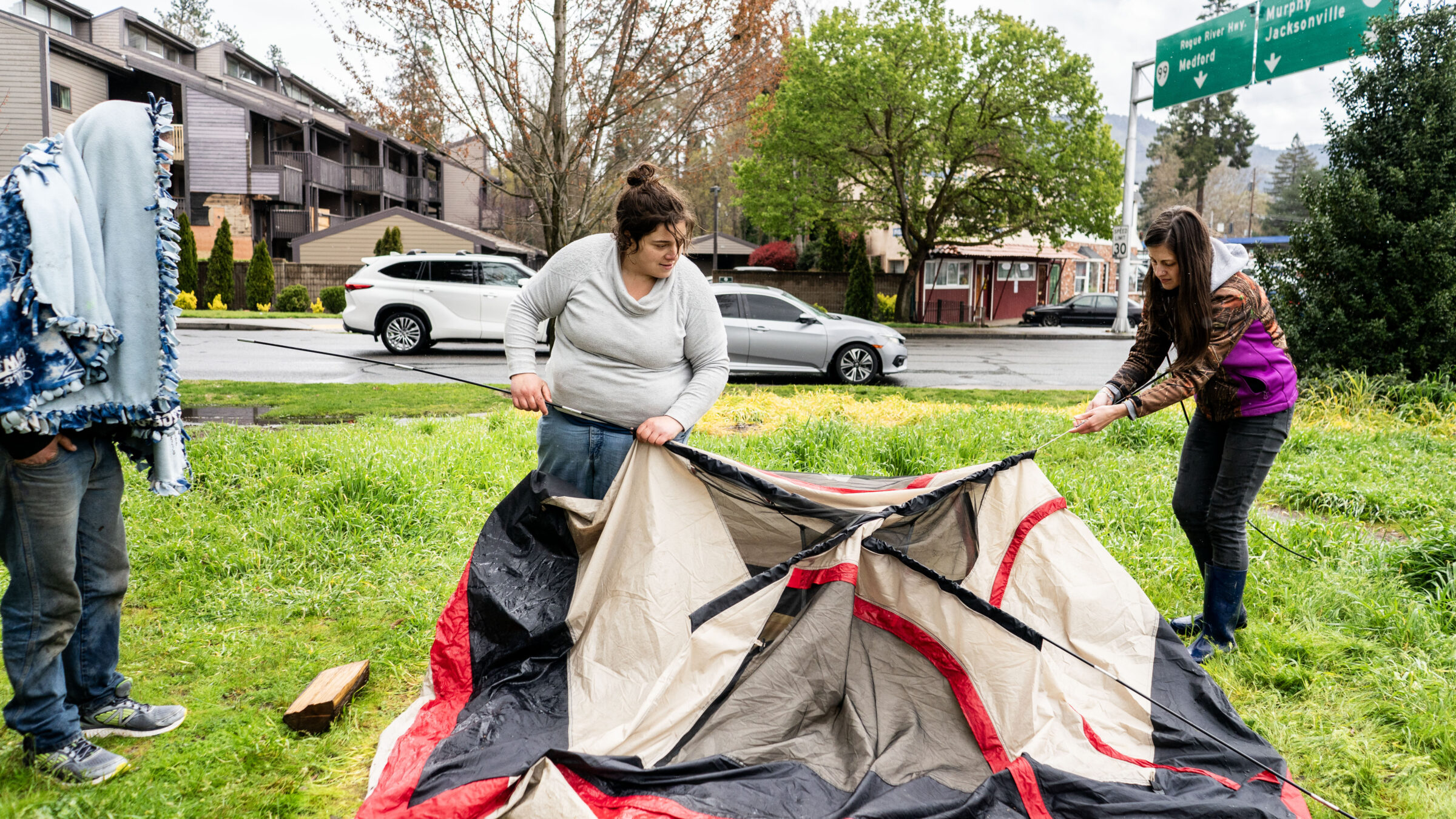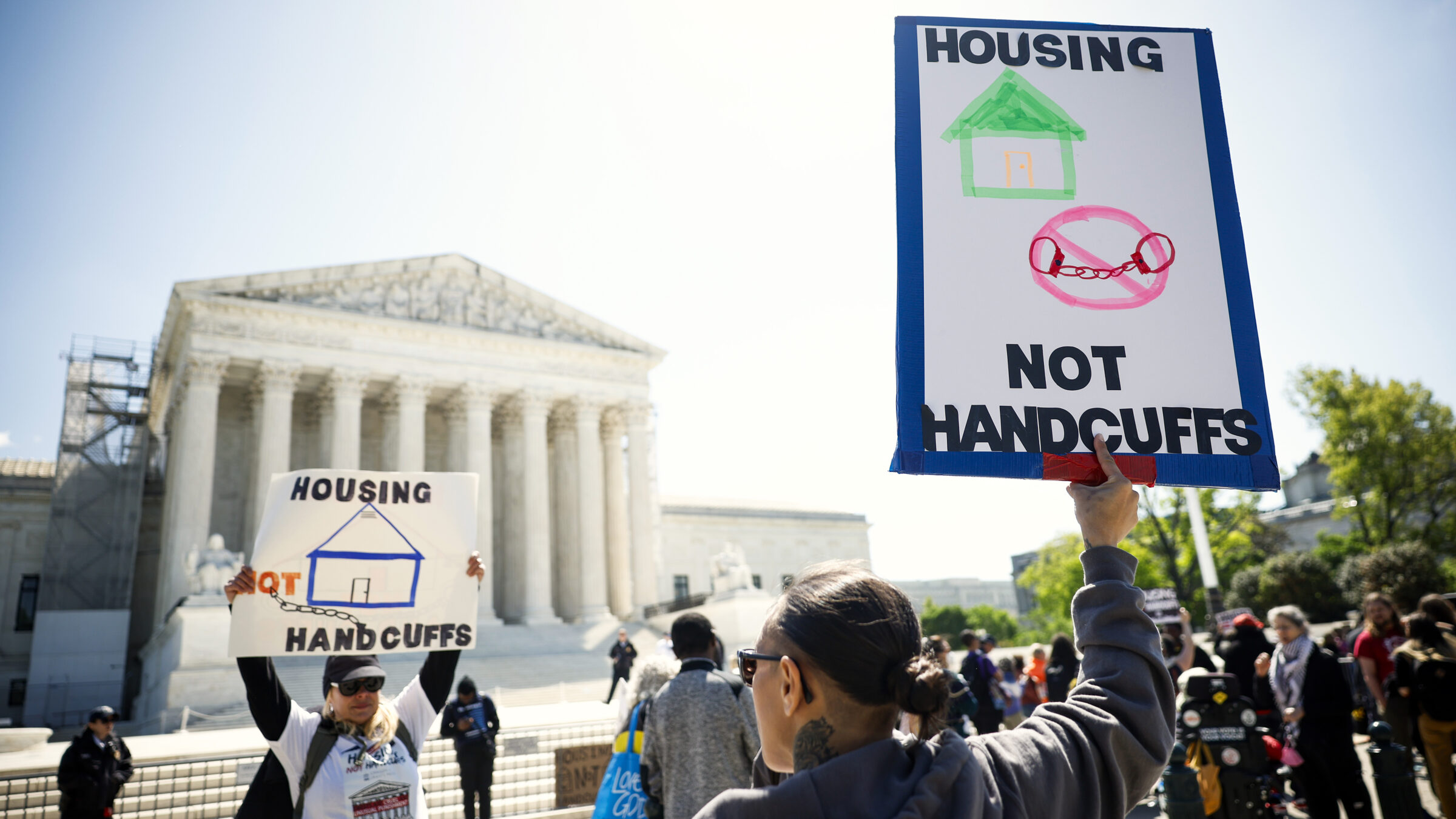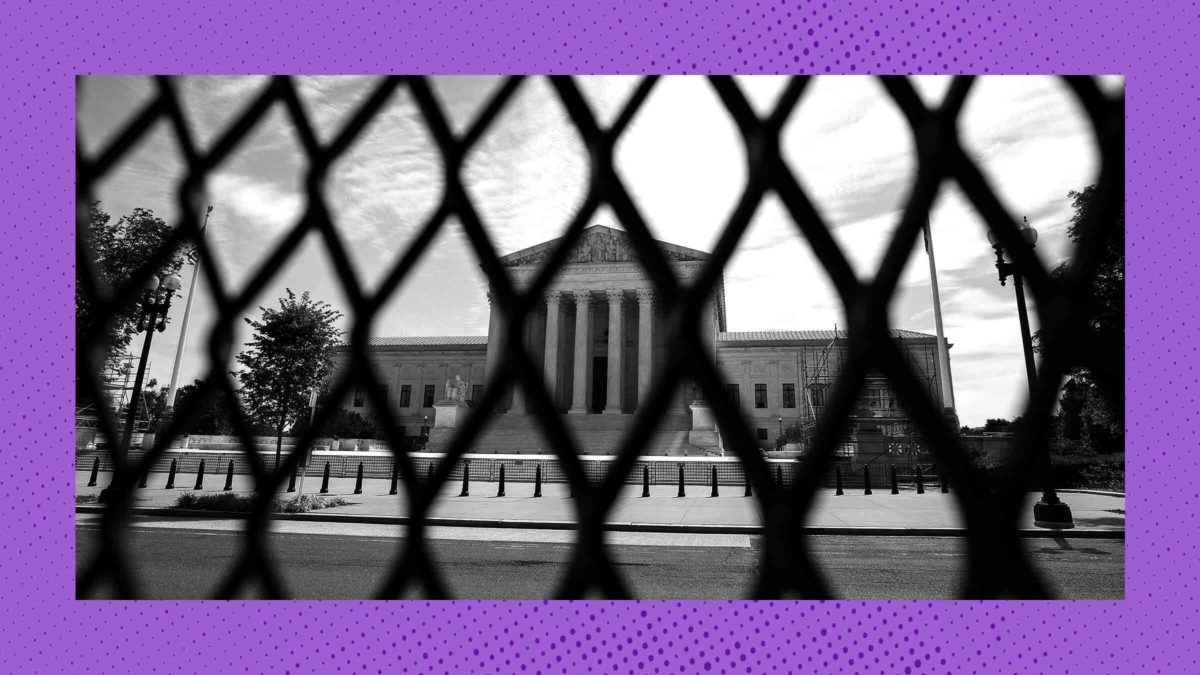On Monday, the Supreme Court heard oral argument in Grants Pass v. Johnson, a case about whether politicians who are chronically unable to solve their cities’ homelessness crises are free to arrest their way out of the problem instead.
The question in Grants Pass is whether enforcing laws that prohibit “camping” on public property constitutes “cruel and unusual punishment” within the meaning of the Eighth Amendment. It’s a challenge to Martin v. Boise, a 2018 case out of the Ninth Circuit Court of Appeals, which has jurisdiction over the three West Coast states in which more than a third of America’s 650,000 unhoused people live. Over the past decade, many communities in these states have passed “anti-camping” laws that impose civil and criminal sanctions, including jail time, on people who are living outside.
The strategy here is as cynical as it is uncomplicated: The city council president in Grants Pass, the 39,000-person Oregon town that passed the ordinance at issue in this case, said that the city’s goal was to make its houseless residents “uncomfortable enough” to leave town altogether. Violations of the ordinance trigger a $295 fine for people who are, again, unhoused; subsequent violations, which can pile up in a single day, can lead to civil exclusion orders, additional fines, and jail time. The law also goes well beyond regulating tents, fires, or encampments, and allows police to cite anyone who so much as uses a blanket to stay warm in public.
In Martin, however, the Ninth Circuit held that under the Eighth Amendment, cities like Grants Pass can only enforce anti-camping laws if there are enough shelter beds for everyone who is “involuntarily” unhoused. The idea is that a government that is already failing its poorest residents does not also have carte blanche to lock them up for the crime of existing without a private place in which to do it.

Volunteer Jessica Meller (R) helps Samantha Crutcher (L) move her campsite after Crutcher was warned by Grants Pass police that she must move her tent or receive a fine or go to jail, March 2024 (Melina Mara/The Washington Post via Getty Images)
Last week, the housing policy experts at the Washington Post editorial board urged the Court to take swift action to rectify this egregious miscarriage of justice. In an editorial titled “There Is No Constitutional Right to Pitch Your Tent On the Sidewalk,” the board lauds the “good intentions” behind the Ninth Circuit’s decision, but frames Martin as a case of judicial overreach that has “arguably…undermined quality of life not only for those who live or work near unsafe encampments, but also for the homeless people themselves.” This remarkable passage reveals a lot about how the board primarily conceives of homelessness: not as a problem for people who are suffering, but as an inconvenience for journalists at legacy media outlets whose office window views might be marred by the sight of people suffering in public.
The problem with Martin, the board argues, is that it created a series of perverse incentives: “Without a credible threat of sanctions against public camping, officials have little leverage to induce people to take shelter beds when they are available,” the board writes. This is (at best) a lazy oversimplification of the Ninth Circuit’s holding, which is, again, pretty limited: Only if cities have beds for everyone can they start arresting unhoused people who do not use them. Despite what the Fox News chyron-esque headline might lead you to believe, Martin did not invent a “constitutional right to pitch your tent on the sidewalk.” It prevents the state from jailing people for being biologically incapable of staying awake indefinitely.
The board gestures at this reality by explaining that courts have applied Martin “narrowly and confusingly,” and in ways that make compliance difficult—for example, by sometimes excluding beds affiliated with faith-based organizations from the relevant count. (Such organizations often impose onerous conditions on the provision of shelter; in Grants Pass, for example, the only option is a “transitional housing” program that requires full-time unpaid work and twice-daily chapel attendance.) Citing an amicus brief from California Governor Gavin Newsom, the board asserts that this uncertainty leaves officials “trapped, at risk of suit for taking action but also accountable for the consequences of inaction.” It also describes the challengers to Martin as a “broad bipartisan coalition” of “leaders from big blue cities and small red towns,” framing their ideological diversity as evidence of the common-sense correctness of their argument.
This sounds like a reasonable-enough request: that the Supreme Court step in to help politicians—both Democrats and Republicans—understand how to fulfill their obligations to safeguard fundamental rights in the unique context of America’s burgeoning housing crisis. The problem is that the leaders of the cities and states in Grants Pass are not actually making this request. Instead, they want the Court to get rid of Martin altogether: to hold that “fines and short jail terms for camping on public property are not cruel and unusual punishments,” and that the Eighth Amendment “does not prohibit enforcement of generally applicable camping ordinances.” A result in Grants Pass that preserves “any form” of Martin, the lawyer for the cities told the Supreme Court on Monday, would be a “disaster.”
Put differently, what the Martin challengers share is not an earnest, across-the-aisle desire to comply with a decision that imposes modest restrictions on their authority to criminalize poverty. It is a humiliating track record of doing anything meaningful about things like income inequality, housing costs, exclusionary zoning, and other root causes of homelessness, and an attendant desire to relieve themselves of any further obligation to care about doing such things. For all the subjects on which conservative legal movement activists and the “Democracy Dies In Darkness” crew might disagree, one on which they can quickly find common ground is the notion that poor people have only themselves to blame for their condition.

Protesters outside the Supreme Court during Grants Pass oral argument (Photo by Kevin Dietsch/Getty Images)
After criticizing Martin for ostensibly doing more harm than good, the editorial arrives at its most casually unhinged assertion: “Federal judges shouldn’t be in the business of issuing injunctions while assessing the quantity and quality of shelters,” the board opines. But issuing injunctions to protect legal rights, and subsequently evaluating compliance with those injunctions, are things that federal courts do—sorry for the legal jargon—all the fucking time. To the extent that Martin transforms judges into amateur “homeless policy czars,” as the board puts it, this is no different than what judges do when deciding cases about abortion access, or immigration enforcement, or voting rights, or student debt relief, or any of the multitudinous policy questions that may come before them.
I am not saying that a legal system that entrusts this much political power to a small group of unaccountable, life-tenured lawyers is without its faults. But the judges who are trying to apply Martin to complex real-world circumstances are not doing anything inappropriate or out of the ordinary. They are simply spending their time and resources to protect a group that Washington Post editorial board members do not especially care about.
The only passage that even glancingly resembles legal analysis arrives in literally the last paragraph, when the board notes that historically, courts have “distinguished between society’s power to impose consequences for unlawful conduct, which the Eighth Amendment regulated, and society’s power to define unlawful conduct, which it does not.” As applied to anti-camping laws, the idea is that the Eighth Amendment would not allow the state to, say, draw and quarter people for sleeping in public, but says nothing about the state’s general authority to make it illegal to sleep in public in the first place.
For my money, this cramped view of constitutional law is the editorial’s most annoyingly sloppy argument. It might be true that Martin’s application of the Eighth Amendment to anti-camping laws in 2024 extends beyond what the gaggle of slaveholding white guys who drafted the Eighth Amendment in 1789 would have imagined. But this has always been and will always be part of the challenge of interpreting a 250-year-old document riddled with esoteric vagaries and aspirational platitudes. The board is not unfamiliar with this dynamic: They will (laudably) go to bat for the existence of other modern rights derived from the Constitution’s text, from abortion care to same-sex marriage. Yet when the stakes are highest for a class of people whom Washington Post editorial board members only encounter when exiting the Farragut North Metro station, suddenly, they are staunch advocates for judicial restraint, happy to parrot credulous, Jesse Watters-level talking points in defense of feckless politicians who are bad at their jobs and have no plans to get better anytime soon.
Overruling Martin, the board concludes, is a necessary step to “help restore order, to constitutional law and to parks, streets and sidewalks across the West.” But this result would not actually mitigate the problems associated with an ongoing humanitarian disaster unfolding in some of the wealthiest communities in the wealthiest nation in the world. It would simply use the criminal legal system to sweep those problems to the side. When the Supreme Court gives you permission to “shelter” poor people by throwing them in jail cells, the idea of doing anything else for them feels a whole lot less urgent.




